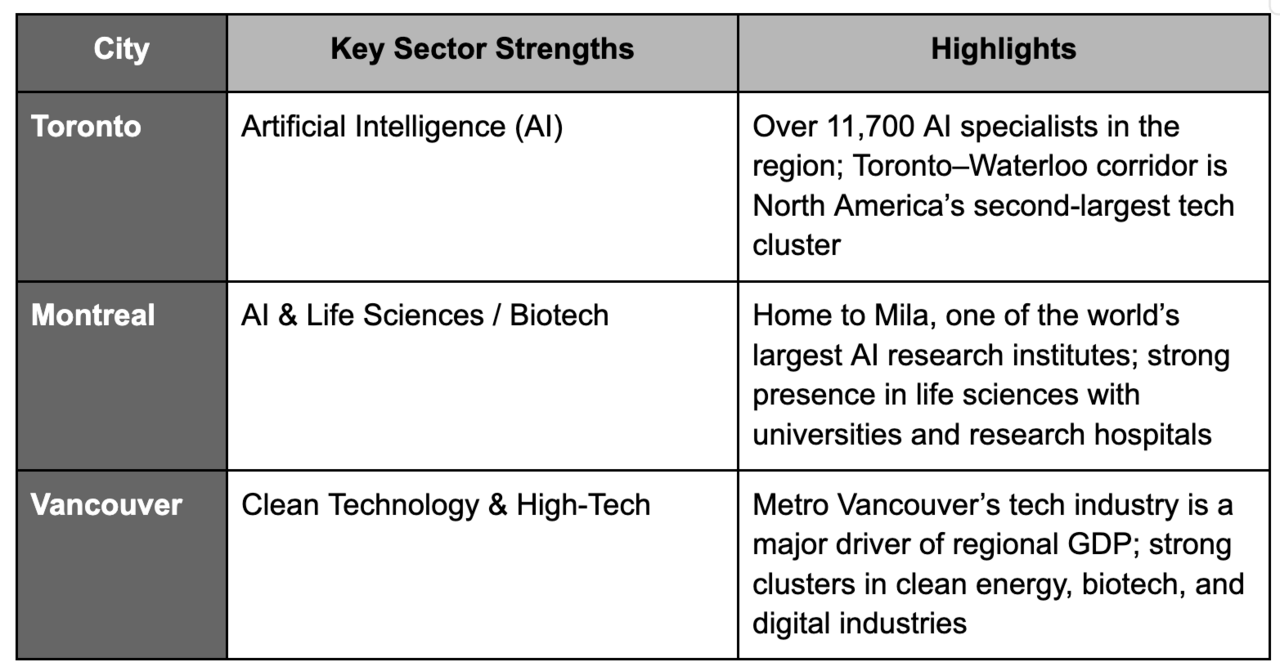Opportunities, Challenges, and Pathways for Japanese Businesses in Canada’s Startup Ecosystem
Introduction:From Trade to Innovation

The global economy is entering a period where innovation increasingly defines competitiveness. While traditional industries still shape Japan–Canada relations, a new wave of startups in artificial intelligence, clean technology, and life sciences is opening fresh avenues for collaboration. Canada’s innovation hubs—Toronto, Montreal, and Vancouver—provide fertile ground for growth, supported by strong research, government incentives, and access to North American markets. The federal government has also committed $275 million (≈¥400 billion) under the Pan-Canadian AI Strategy to accelerate commercialization. For Japanese companies, these developments highlight opportunities that extend well beyond trade and investment.
Building on the first article, Trading across the Pacific: Unraveling Opportunities in Canada for Japanese Businesses, this second part turns to the emerging startup ecosystem and explores how it can become the next pillar of Japan–Canada partnership.
Overview: Canada’s Startup Ecosystem
Canada’s innovation landscape is defined by its technology hubs, where startups thrive in artificial intelligence, clean technology, and life sciences. These cities not only concentrate talent and research institutions but also attract venture capital and international partnerships, making them focal points for global collaboration.

Each hub demonstrates how Canada’s technology strengths align with global demand: Toronto leads in AI talent and applications, Montreal combines advanced research with a vibrant biotech ecosystem, and Vancouver positions itself at the intersection of clean energy and digital industries. For Japanese businesses, this diversity offers entry points into complementary areas of innovation, from AI-driven manufacturing to sustainable technologies.
In addition to sectoral strengths, although it was already mentioned in the previous article, Canada also benefits from its geographic and policy advantages. Sixteen of its twenty largest cities lie within a 90-minute drive of the U.S. border, anchoring daily cross-border trade worth over $3.6 billion (≈¥520 billion). At the same time, generous R&D tax incentives, the Global Skills Strategy, and the Startup Visa Program create a supportive environment for innovation. Ranked 2nd in the G20 for ease of doing business and home to nine companies listed in the Global Cleantech 100, Canada is increasingly seen as a launchpad for international collaboration.
Opportunities and Challenges for Japanese Businesses
Opportunities
Canada’s startup ecosystem offers attractive opportunities for Japanese firms through joint R&D, strategic investment, and collaboration with local accelerators. Japan’s strengths in manufacturing and capital align well with Canada’s innovation-driven environment, particularly in AI, clean technology, and biotech.
One example is the July 2024 partnership between Canadian AI startup Cohere and Fujitsu to develop a Japanese-language large language model (LLM) tailored for enterprise use. Running on private cloud infrastructure to meet strict security and privacy standards, the service targets sectors such as finance and government. Fujitsu also invested in Cohere, which had recently raised $450 million (≈¥675 billion) from NVIDIA, Salesforce, and Cisco at a valuation of $5 billion (≈¥7.5 trillion). This collaboration demonstrates how Canadian innovation and Japanese market expertise can generate globally competitive solutions.
Further momentum came from the Osaka–Kansai Expo 2025, where JETRO and Toronto-based accelerator DMZ highlighted opportunities in real estate, construction, and mobility. Canada’s rapid urbanization is fueling demand for modular housing, sustainable building technologies, EV infrastructure, and AI-driven transport systems—areas where Japanese startups are well positioned to contribute.
Challenges
However, challenges still remain. According to a 2024 article in Research Money reporting on a study by Canadian scholars, Canada’s innovation policies have struggled to support scaling tech firms. While favorable conditions exist for startups, relatively few Canadian companies grow into globally competitive enterprises. The study highlights a heavy reliance on tax credits such as the SR&ED program, with limited direct grants or procurement support. Combined with the small domestic market and scarce patient capital, these factors constrain the ability of startups to scale internationally. For Japanese businesses, this means that while opportunities are strong, targeted support and bridge programs will be essential to navigate regulatory and funding gaps when entering Canada’s ecosystem.
Conclusion:Building the Next Pillar of Collaboration
As Japan and Canada enter a new phase of collaboration, innovation and startups are emerging as the next frontier. From AI partnerships to sustainable mobility solutions, the opportunities are clear—but so are the challenges of scaling, regulation, and cross-cultural business. With tailored support, these hurdles can be transformed into stepping stones.
At EXPACT, we help startups and businesses bridge these gaps, from market entry to fundraising and partnerships, enabling them to thrive in new ecosystems. In this way, startup collaboration can truly become the next pillar of a resilient and future-oriented Japan–Canada relationship.
About EXPACT
EXPACT provides a variety of operational support to domestic and international startups.
EXPACT offers market entry strategy advisory for international businesses looking to establish a presence in Japan. Our services are as follows:
– Advice for visas and programs: Providing guidance on suitable visas and government programs for foreign entrepreneurs (e.g., Startup visa).
– Market research assistance: Evaluating the potential market size and demand for the product or service.
– Geographical evaluation based on the company’s target: Carrying out a location analysis to determine the most suitable region, prefecture, and city according to the startup’s specific needs.
– Support for applying for financial aid programs: Sourcing and supporting the application process for applicable government grants and subsidies.
– Assistance for forming partnerships: Serving as a liaison to help the startup establish connections with local partners, investors, and government institutions.
– Advice for a business plan: Offering a business plan review with insights from a Japanese perspective.
– Translation services: Providing translation services for in-person meetings, virtual discussions, and document preparation.
Additionally, the company also offers One-Stop support from Startup advisory to Finance, PR, Recruitment and EXIT.
- Finance and Fundraising: Advisory on the financial health of startups and proposing an optimal fundraising plan by applying for government grants and facilitating investor introductions. Activities include drafting a pitch deck, and forming a business plan and/or cap table.
- Promotion: Publishing press releases, building media relations, branding.
- Startup Advisory: Business ideation, researching, conducting interviews, MVP analysis, investment access.
- Human Resources: Personnel strategy, hiring support, institution building.
- EXIT: IPO support, M&A support, exit system design.
For assistance or additional information, please contact us at info@expact.jp for inquiries.
Inquiries on market entry strategies can be directed to pramod@expact.jp
Written by Pramod Sharma & Hana Miyagi
References:
https://ised-isde.canada.ca/site/global-innovation-clusters/en
https://torontoglobal.ca/business-insights/toronto-as-a-leader-in-specialized-ai-talent/
https://investvancouver.ca/Documents/high-tech-engine-boosting-economic-landscape.pdf
https://www.jetro.go.jp/biznews/2024/07/a785175ed601e073.html
https://www.jetro.go.jp/biznews/2025/08/aaa02610e9ed386f.html
